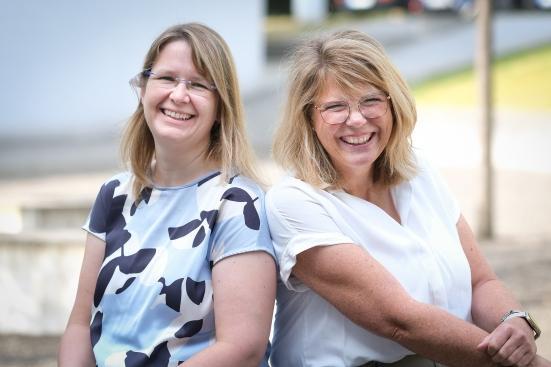Listening and making offers
First aid can be crucial in an emergency. But what if you need acute psychological rather than physical help? Then those affected often try not to let their mental stress show - especially not in the workplace. "It is important to recognize who is not feeling well in the place where people spend so much time. We have addressed this and are currently training Mental Health First Aiders (MHFAs)," explains Sabine Tröster-Müller from Occupational Health and Safety at the University of Siegen.
The first 19 university employees have now completed the relevant training. Their task? "To support colleagues in crises and with mental health problems and to arrange professional help if necessary," says Sabine Tröster-Müller.
"Mental health is a major issue that is very close to the heart of the university management," emphasizes Rector Prof. Dr. Stefanie Reese. It is admirable that the employees are committed to this sensitive area.
First and foremost, the first responders have an open ear for the concerns of others. "But we should also be attentive in our surroundings and approach those with whom we have the impression that they might need help with empathy," says Maike Schramm. As an administrative employee and contact person for occupational integration management, she is one of the new first aiders for mental health who have taken part in a corresponding online training course. Maike Schramm emphasizes that this prepares them for the task, but of course they have no therapeutic training. It's mainly about noticing signs in others that make it clear: Someone has problems.
"How do you then seek a conversation without appearing abusive?" says Maximilian Eller, describing a key question for mental first aiders. He himself works at the Central Student Advisory Service (talent scouting) at the University of Siegen, and he was very familiar with many of the topics of further education from his studies in educational science. "But this is also a new role for me," says Eller. "As mental first aiders, we are first and foremost mediating listeners." We can point out offers, regardless of whether someone is currently struggling with a drastic experience or is experiencing too much psychological stress.
"We offer support, a kind of protected space in the work environment, where you actually always try to function, even when you're feeling bad," emphasizes Eller. It is important to signal to colleagues: Someone is interested in how I'm doing. With this offer, the university as an employer is also making it clear that mental health problems must not be ignored. "People work here. Sometimes with physical problems, sometimes with mental problems," says Eller. "You have to be allowed to talk about everything." He, Maike Schramm, Sabine Tröster-Müller and the other first aiders are ready to help. Anyone looking for a contact person should get in touch with Sabine Tröster-Müller for further mediation.
All first aiders are bound to secrecy and all conversations are absolutely confidential.


